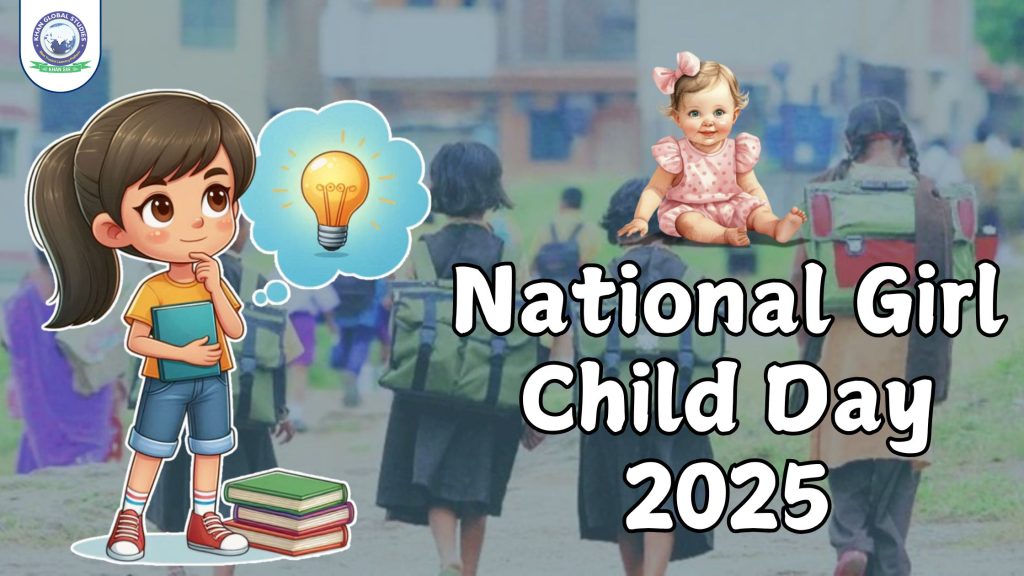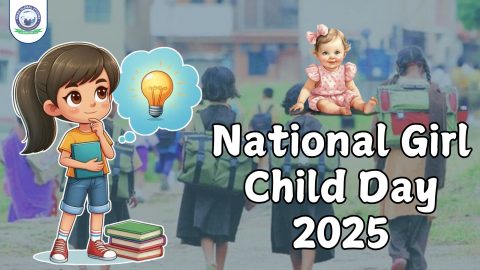National Girl Child Day 2025 is an important event that aims to promote the rights of girls and promote gender equality. Celebrated annually on January 24, the day calls for action to ensure equal opportunities for girls in areas such as education, health, and safety.
The objective of National Girl Child Day 2025
The primary objective of National Girl Child Day is to raise awareness about the challenges faced by girls and advocate for their rights. The day emphasizes on the following:
- Eliminating gender discrimination.
- Promoting education for girls.
- Ensuring health and nutrition.
- Addressing issues such as female foeticide and child marriage.
History of National Girl Child Day
National Girl Child Day was first celebrated in 2008, initiated by the Ministry of Women and Child Development. The day was established to combat the deep-rooted inequalities and prejudices faced by girls. Over the years, it has become a pivotal moment to advocate for policy changes and societal shifts towards empowering girls.
Key Achievements
- 2008: Launch of National Girl Child Day.
- 2015: Launch of Beti Bachao Beti Padhao initiative.
- 2019: Greater focus on girls’ health and education.
Significance of National Girl Child Day 2025
The significance of National Girl Child Day lies in its ability to:
- Create awareness about issues such as gender inequality and violence.
- Encourage dialogue on child marriage, education, and health.
- Highlight the achievements of girls in various fields.
- Promote government schemes for the welfare of girls.
The theme of National Girl Child Day 2025
Though the official theme for 2025 is yet to be announced, previous themes have focused on important aspects such as education, health, and safety. The theme serves as a guiding principle for the day’s activities and policies.
Status of Girl Child in India
The status of girls in India has improved due to various government schemes, yet challenges remain.
Key Statistics
- Sex ratio at birth: increased to 937 (2020-21)
- Under-five mortality rate (female): 33 per 1,000 live births
- Gross enrollment ratio in higher education: 2.07 crore females (2021-22)
- Nutrition: Stunting decreased to 35.5% (NFHS-5, 2019-21)
Government Initiatives for Girl Child
The government has launched several initiatives aimed at improving the status of girls in India:
- Beti Bachao Beti Padhao (BBBP): Launched in 2015, this initiative aims to improve the child-sex ratio and promote girls’ education.
- Sukanya Samriddhi Yojana (SSY): A savings scheme that encourages parents to save for the education and marriage of their daughters.
- Balika Samriddhi Yojana (BSY): This programme provides financial assistance to families with girl children, especially those from economically disadvantaged backgrounds.
- Ladli Yojana: It aims to encourage families to value daughters, and provides financial incentives for the birth of a girl child.
- National Scheme for Incentives to Girls for Secondary Education (NSIGSE): This scheme promotes secondary education among girls from disadvantaged backgrounds by providing financial incentives.
- CBSE Udaan Yojana: This scheme focuses on increasing the enrolment of girl children in higher education by providing free coaching for competitive examinations.
- Scheme for Adolescent Girls (SAG): Launched in 2010, this scheme provides nutritional support to out-of-school girls in the age group of 11-14 years.
Celebration Ideas for National Girl Child Day 2025
To make National Girl Child Day 2025 impactful, consider these celebration ideas:
- School Assemblies: Organize assemblies to raise awareness about gender equality and girl child rights.
- Panel Discussions: Organize discussions with women leaders and activists to highlight the importance of empowering girl child.
- Contests: Organize drawing or essay competitions for children to express their views on girl child rights.
- Community Initiatives: Launch initiatives to provide girls access to education and health services.
- Rallies and Marches: Organize events to promote girls’ education and equality in society.
- Workshops: Organize workshops that focus on girls’ self-esteem, health, and leadership skills.
- Documentary Screenings: Show documentaries that show inspiring stories of young girls overcoming challenges.
- Art Exhibition: Create exhibitions that highlight the role of girls in society and their potential to bring about change.
- NGO Partnership: Collaborate with NGOs to provide resources such as books, stationery and sanitary products for underprivileged girls.
- Social Media Campaign: Use social media platforms to share empowering messages and promote gender equality.
Conclusion
National Girl Child Day 2025 is an important occasion to reflect on the progress made and challenges in achieving gender equality. By supporting initiatives and raising awareness, we can ensure a brighter future for girls in India.
Frequently Asked Questions
Q: What is National Girl Child Day?
Ans: National Girl Child Day is celebrated every year on 24 January to promote the rights of girls and raise awareness about the challenges they face.
Q: Why is National Girl Child Day celebrated?
Ans: The day is celebrated to eliminate gender discrimination, promote education, and ensure the health and safety of girls.
Q: When was National Girl Child Day first celebrated?
Ans: It was first launched in 2008 by the Ministry of Women and Child Development.
Q: What are some government schemes for girls in India?
Ans: The main schemes include Beti Bachao Beti Padhao, Sukanya Samridhi Yojana, Balika Samridhi Yojana, and CBSE Udaan Yojana.
Q: How can we celebrate National Girl Child Day?
Ans: You can celebrate it by organizing school assemblies, panel discussions, rallies, and workshops focused on empowering girls.




